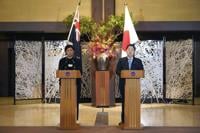TOKYO (AP) — The foreign ministers of Japan and New Zealand agreed on Monday to speed up talks on an intelligence sharing pact as the two island nations vowed to strengthen security ties and cooperation in the Indo-Pacific region amid shared concern over an increasingly assertive China.
New Zealand Foreign Minister Nanaia Mahuta and her Japanese counterpart, Yashimasa Hayashi, also agreed during their talks in Tokyo to collaborate on priority issues for Pacific Island nations such as climate change, maritime security and infrastructure.
The two countries pledged to ensure that the Pacific Island region, where China's influence is rapidly expanding, remains stable and prosperous and free from foreign interference and coercion, and that the "rights, freedoms and sovereignty of all countries regardless of size or power are protected,” according to a statement released by Japan's Foreign Ministry.
Hayashi said Japan, under its new ��ɫֱ�� Security Strategy, is strengthening cooperation with like-minded countries to maintain and expand the "free and open” international order, and that cooperation with New Zealand is extremely important.
In December, Japanese Prime Minister Fumio Kishida's government adopted key security and defense upgrades, including a counterstrike capability that breaks with the post-World War II principle limiting Japan to self-defense, while doubling defense spending in five years.
Kishida told a parliamentary session on Monday that the Defense Ministry is purchasing 400 U.S.-made Tomahawk cruise missiles for deployment as early as 2026. The Tomahawks would be used on Aegis radar-equipped destroyers and would be capable of striking targets as far as 1,600 kilometers (1,000 miles) away.
But potential counter-strike usage requires highly advanced cyber-security and intelligence, which Japan lacks. It has been hoping to develop closer ties with members of the “Five Eyes” intelligence alliance and has signed intelligence-sharing agreements with the United States, Australia and Britain, and is discussing pacts with the two remaining members, New Zealand and Canada.
Hayashi said he and Mahuta agreed to “accelerate an early conclusion of an information security agreement, which will be a foundation of security and defense cooperation between the two countries.”








































